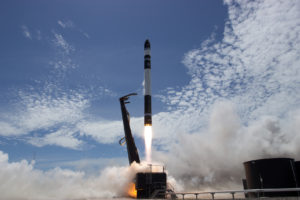
U.S. orbital launch provider Rocket Lab has announced its first commercial launch for New Space companies Spire and GeoOptics, further establishing New Zealand as a space launch power.
Rocket Lab will open a 14-day launch window beginning 20 April 2018 to conduct its first fully commercial launch. The mission, named ‘It’s Business Time’, will include manifested payloads for Spire Global and GeoOptics Inc., built by Tyvak Nano-Satellite Systems.
‘It’s Business Time’ will launch from Rocket Lab Launch Complex 1 in New Zealand. Licensed to launch every 72 hours, Rocket Lab Launch Complex 1 is the world’s only private orbital launch facility.
Rocket Lab is a private, dedicated small launch provider deploying satellites to orbit. ‘It’s Business Time’ marks the fastest transition a private launch provider has made from test programme to fully commercial flights. It is scheduled only three months after Rocket Lab’s January launch “Still Testing”, which successfully deployed an Earth-imaging satellite for Planet and circularized the orbit of two weather and AIS ship tracking satellites for Spire Global using its in-house designed and built kick stage.
“It’s Business Time represents the shift to responsive space,” said Rocket Lab founder and CEO Peter Beck. “We always set out to create a vehicle and launch site that could offer the world’s most frequent launch capability and we’re achieving that in record time,”.
“Rocket Lab is the only small launch provider that has reached orbit and delivered on promises to open access to space for small satellites. We can have payloads on orbit every 72 hours and our rapidly expanding manifest shows this is frequency is critical for the small satellite market,” he added.
To meet a burgeoning 2018/19 launch manifest, Rocket Lab has rapidly scaled production of the Electron launch vehicle across its headquarters and production facility in California. The company will produce 100 3D printed Rutherford engines this year to support a monthly launch cadence by the end of 2018.





